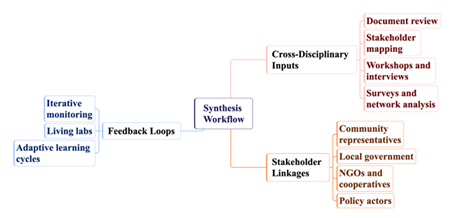Mapping Collaborative Governance for Effective Community Engagement in Urban Hygiene Campaigns
Main Article Content
Abstract
: This paper presents an integrated, results-grounded governance framework for co-developing hygiene campaigns in informal settlements. Background: partnerships are undermined by misaligned incentives, resource scarcity, and institutional fragmentation, while inclusion and accountability claims often lack empirical support. Problem gap: existing participatory and network models under-specify enforceable power-sharing, measurable trust, and scalable feedback under constraints. Methodology: we apply a mixed-methods design combining document review, stakeholder mapping, interviews, workshops, surveys, and network analysis, operationalize seven dimensions with indicators, and aggregate composite scores using Multi-Criteria Decision Analysis (MCDA) via Analytic Hierarchy Process (AHP) and Technique for Order Preference by Similarity to Ideal Solution (TOPSIS), with triangulation, disaggregation, and reliability checks. Outcomes: cross-source evidence indicates increases in stakeholder satisfaction, engagement, adaptability, feasibility, and framework comprehensiveness, with partial alignment between perceived legitimacy and MCDA rankings; cooperatives tended to outperform transient clusters, while leadership turnover and resource-pooling gatekeeping sometimes slowed decisions. Contribution: the framework codifies resource-sharing compacts, inclusive decision protocols, and iterative monitoring and learning cycles, and embeds trust metrics for auditability. Limitations include short follow-up, small samples, and self-selection. Practical implication: the approach enables practitioners and policymakers to institutionalize transparent consultation, prioritize investments, and adapt campaigns responsively under capacity and data constraints.
Article Details

This work is licensed under a Creative Commons Attribution-ShareAlike 4.0 International License.

